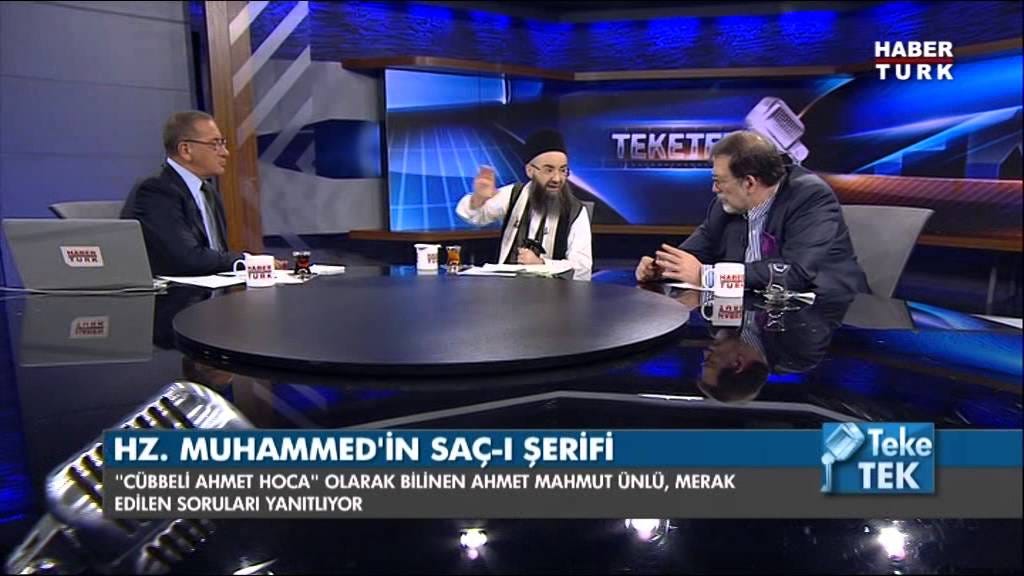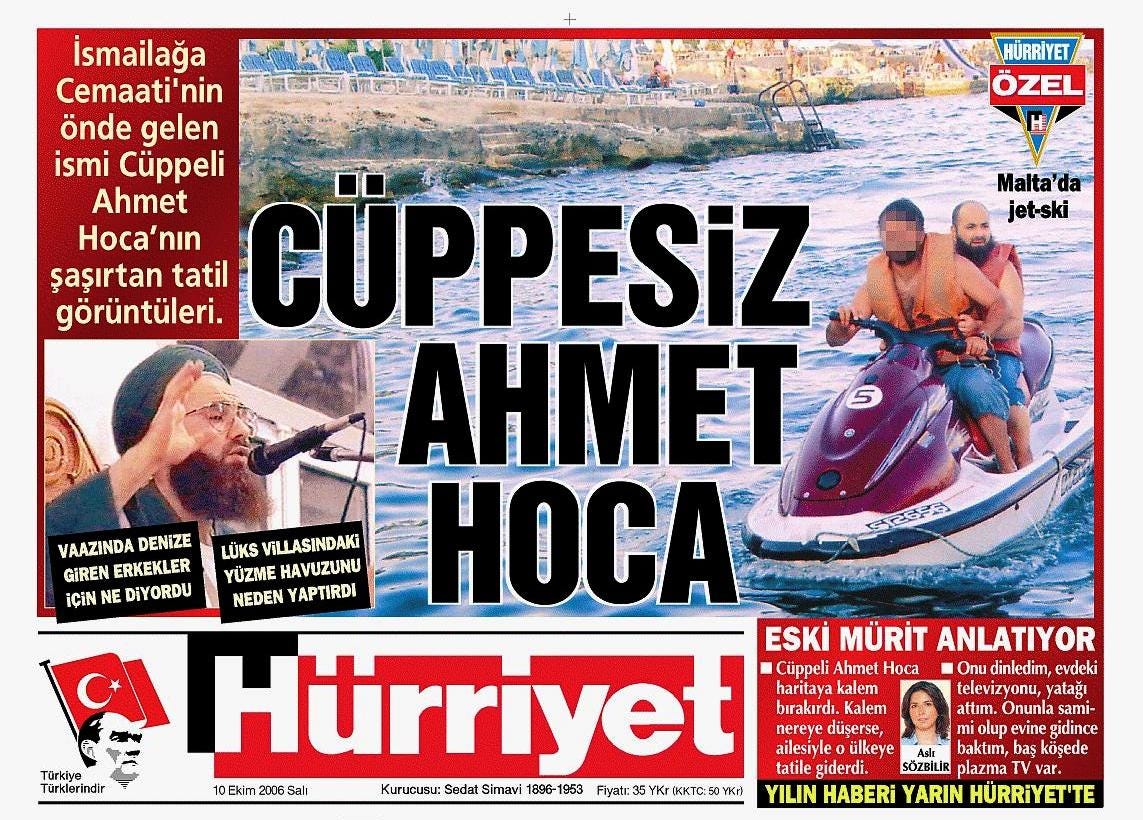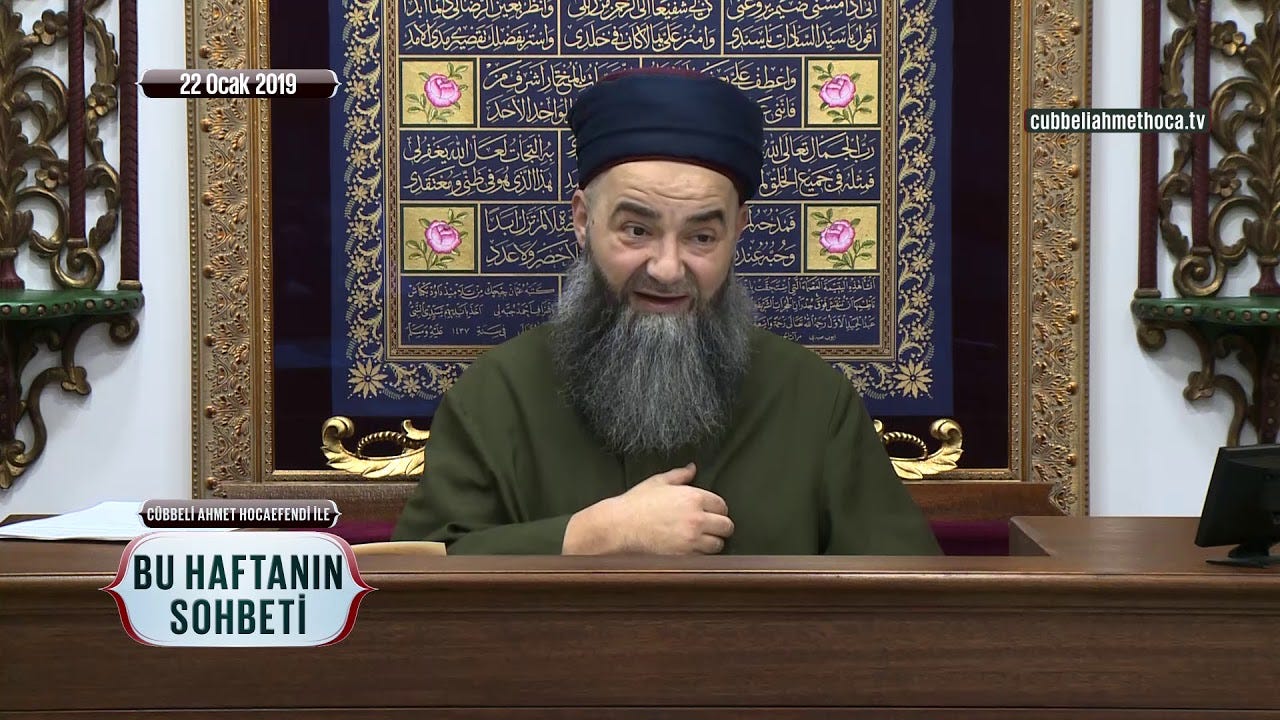At Muslim funerals, men line up in rows for a very quick (and mercifully simple) prayer. In June, Mahmut Ustaosmanoğlu, the head of the most powerful religious order in Turkey, died. At his funeral prayer were rows upon rows of dignitaries from across the political spectrum, as well as the country’s foremost clerics.
Most people watching on TV, however, wouldn’t have known the name of the leader of the İsmailağa order, nor would they have known the names of the people at the funeral vying to replace him.
Most people were probably looking for the one member of İsmailağa they knew by name, the one man they felt connected to: Cübbeli Ahmet Hoca (‘hodja’). At the funeral, they buried him in the fourth row (above), probably because they didn’t want his celebrity status to overshadow the events of the day.
The name literally means “Ahmet the robed cleric”, or for short, “Cübbeli,” meaning “the robed one.” His driver’s license says Ahmet Mahmut Ünlü, but I will conform to custom and refer to him here as Cübbeli.
As with most powerful people in Turkey today, Cübbeli’s family is originally from the Black Sea, but he was born in Istanbul in 1965. His father was wealthy and deep into İsmailağa, both of which was immensely exciting to young Ahmet. When he was 7, people started calling him “Cübbeli Ahmet” because he insisted on wearing robes. At 12, he was already preaching to congregations. He had an exceptionally vivacious mind, and in addition to memorizing the Quran (a basic requirement in those circles) would quote various religious scholars at length. He could also crack jokes and recant stories with the best of them, and despite his diabetes, be talking long after the competition was home and in bed.
Like most popular clerics in the 1980s and 1990s, Cübbeli was full of fire and brimstone. In the 1990s, he fulminated against the secularism of the Republic, the alcohol, the unveiled women, the Darwinist curricula. He went to prison for saying that the big 1999 earthquake was a punishment from god.
His family background, ebullient energy, and a considerable business instincts have allowed Cübbeli to create his own media ecosystem of sorts, with a radio station and TV channel, and later, a website and very popular social media channels. He moved to a large villa in Acarkent, a rich Istanbul neighborhood.
Most people, however, will have seen him on Habertürk, a big news channel where he is often on Teke Tek with the host Fatih Altaylı and historian Murat Bardakçı. They first had him on in 2009, and the program was such a hit that they kept inviting him back.
These sessions mostly consisted of the two secular types asking Cübbeli questions that ordinary viewers may find interesting. Why do we have to pray 5 times a day? (God requested 50, but Moses and Muhammed bargained him down to 5.) What happens to good people who aren’t Muslims? Don’t they get to go to heaven? (No. Sorry, not sorry.) How will heaven be governed? (there won’t be a need.)
In Cübbeli’s telling, god and his angels operated a giant bureaucracy and passed around files of your weekly performance. His version of the story of the prophet Idris (Enoch) and the angel Azrael features crisp dialogue and is dotted with punch lines, all the while speed-quoting Quranic verse.
These programs were also a sign of the Erdoğan era, in which Islamic identity was to be approached with deference. On Habertürk, the nation watched as two supposedly serious adults turned into school children in front of the robed man, starting every other sentence with “hocam,” (“my teacher”) listening to every word with rapt attention. It wasn’t that Altaylı and Bardakçı actually believed their esteemed guest - you could tell that they weren’t about to repent their sinful ways and start praying (only!) five times a day. It was more that with the AK Party in power, religiosity was the new social currency, and these programs seemed like an easy way to catch up.

There was more to it though. Like every celebrity, a big part of Cübbeli’s appeal is about sex. Already in the 2000s, he was known for going on beach holidays (pious Muslims eschew the “nakedness” of the seaside) and even riding a jet ski at a beach in Malta. He didn’t make a secret of this. He even seemed to enjoy the attention this brought on him. When asked about his beach holidays, he’d respond with technicalities about how he attended sections of the beach that were reserved for his family alone, but you could never be sure. Was Cübbeli a hypocrite? Did he want to see bikini-clad women just like everyone else? Were all pious people secret perverts? The press loved it.

Things got a little more serious when in 2010, a sex tape of his hit the internet (he denied its veracity, but it was pretty, uh, convincing material as I recall). Soon afterwards, he was tried for human trafficking and engaging in the sex trade (he was acquitted). He would later say that these revelations and legal accusations were fabricated by the Gülenists, and that he was a serious religious scholar and good Muslim.
Still, he never exactly stayed away from the subject of sex. By far the most popular YouTube video on his channel is the one where he reflects on whether oral sex is permitted in Islam (it’s mekruh he says, meaning that it should be avoided, but not technically a sin. Like smoking). In 2018, Cübbeli published a book entitled Verses Appropriate For Reading Over Every Bodily Extension (Organ), which contained recommendations for curing erectile dysfunction by blessing water with specific Quranic verses and sprinkling it on the penis in distress. This triggered a minor scandal (the press dubbed it the “penis prayer”) and brought at least one lawsuit and a media storm on Cübbeli. I imagine that the book sold well.
So that slightly titillating aspect to Cübbeli was part of his persona early on. People sensed that the ascetic robes were a thin disguise for promiscuous thoughts and suppressed appetites. And once you think that, you can’t unthink it. It’s right there in the way he moves his hands, licks his lips, the way he’s calm and collected when the people around him smile their naughty smiles at him. When you watch Cübbeli, part of what you’re watching is always that.
As distant as it may sound, I think there’s a parallel here with The Daily Show in the United States in the 2000s. There too, the idea was that you would combine something that was considered serious (current affairs) and couch it in something entertaining (a comedy/talk show). I think the story Cübbeli told himself was that he was trying to take something serious (Islam) and couch it in something entertaining (a celebrity storyteller). “Cübbeli” was sort of an alter-ego, the naughty cleric who could make you laugh while making you a better Muslim at the same time.
He would sometimes say this explicitly. The libel and lawsuits and false accusations were OK, he said, because it meant that more people would tune in to his shows, and would therefore be exposed to his message, which made them better Muslims. It helped him save souls. So what if he enjoyed the popularity along the way? So what if he made a mistake here and there? Didn’t he deserve it? Didn’t he ultimately call the nation back to religious practice?
Looking at his more recent appearances, I don’t think that clear that Cübbeli is happy with the way things went. I sense regret. Here he is appearing on the show of Okan Bayülgen, an old celebrity talk show host:
Right at the beginning of the program, Bayülgen is heaping praise on his guest:
There cannot be a TV-person who doesn’t want you. Everyone watches you because all of your programs are very easily watchable, have high ratings.
Things then take a bizarre turn. Bayülgen says he pitched his former TV bosses a program where Cübbeli would perform meal and tafsir (translation and interpretation of the Quran) on a regular basis on TV:
When I talked to TV managers in your absence, I said the gentleman [Cübbeli] is willing to do something like this, but if you, in the third or fifth program, get up and say ‘come now let’s make this Cübbeli Ahmet Hoca program a little more fun, let him receive a telephone call and have someone ask questions there, and let Cübbeli Ahmet Hoca respond with jokes,’ that will not do.
Cübbeli agrees that it wouldn’t. Not many people don’t know it, he says, but he is a serious scholar. I personally empathize with the TV bosses on this one though. Cübbeli literally owns his own TV channel where he can talk about theology as much as he wants. Why would he go on mainstream TV for that? Who would watch it? It would be like watching Michael Jordan play golf. He might be better than average at it, but that’s not what he’s famous for.
For the past couple of years, when Cübbeli has gone on TV, he hasn’t been as quick with the jokes as he used to be. No, Cübbeli now takes to the airwaves to warn the nation of an impending danger: Salafism. The literalist reading of Islam, he says, is taking over the religious scene, and they’re not as nice as he is. The Salafis are developing a vast underground network, stockpiling weapons, waiting for the opportune moment to deal a decisive blow against the secular order of the Republic. They are led by Syrians, he says, who don’t feel an attachment to the Turkish state. The subtext to these warnings is that the immediate post-Erdoğan era will be a time of disorder in which these groups can thrive.
Cübbeli should be scared. There are serious journalists who can confirm the rising popularity of transnational Salafism in Turkey. The police raids Islamic State (IS) cells in Turkey on a regular basis. We know that these groups despise the Hanafi-Maturidi tradition of the Ottoman empire, and its tariqah orders that Cübbeli and the Nazshbandi İsmailağa order belong to. Cübbeli was considered an extremist in his youth. Now he is the establishment, and he is sounding the alarm as the next wave of revolutionaries are closing in on the crooked order he and his ilk have built.
As Erdoğan’s power is waning, it’s very common in Turkey for the formerly far-right elite to be filled with regret, to remember the Kemalism with apologetic appreciation. In the cities, many people are becoming more secular. Others, especially people more exposed to the economic turmoil, the corruption, the crime, turn towards more hardened forms of the old religion. Perhaps we’ll remember people like Cübbeli as a gateway drug, a mild numbing agent that the nation discarded once more potent products hit the market.
BONUS: some of my favorite Cübbeli moments and memes
Cübbeli’s educational attainment:
This is a program they did on Habertürk where they invite someone, have them sit in a plush red chair, and a few journalists (3 + moderator) sitting in front of the person ask him questions (on Turkish TV, the journalist-to-guest ratio sometimes indicates the importance of a person.)
So here, one of the journalists asks Cübbeli about his educational attainment. Cübbeli says he has attained the highest degrees of the Ottoman ulema and teaches people who went through the official theological seminaries in Turkey. When the journalist presses him for his official educational attainment, Cübbeli says “I’m a middle school graduate. I didn’t go to theological school, I avoided it on purpose.” The journalist asks why he didn’t go. He says “I read and was teaching. I wasn’t going to be a [government] imam. I didn’t want to be a [state] official. My father was rich - so if you aren’t going to assume a post and you aren’t going to get a salary, getting a diploma wasn’t going to be a plus for me. If all the people with diplomas come here, you don’t offer them the red chair.” The journalists laugh. “Why do you seat me in the red chair? Why do you do a special program for me? It turns out if you do your job well, you will have a place with the people.” It’s one of his more admirable moments.
Kiss me, lick me:
I can’t think of a better way to explain the man. This is the early Cübbeli. He’s talking about a pop singer who has written 1040 songs.
“He’s rattled off some stuff at night, and it’s manic stuff, and all the maniacs and idiots have filled up as customers. And he’s selling millions, millions! And what’s the issue at hand? ‘Kiss me, lick me, slap me [I think]’ crazy business!’”
The video then goes into a remix of him saying ‘Kiss me, lick me, slap me [I think]’ crazy business!”, cut with scenes of group dhikir sessions, in which Muslims repeatedly chant a certain phrase to get into a state of meditation. That’s the magic of the man: he’s preaching against the immorality of pop culture, but we all sort of know he doesn’t mean it, and the video duly erupts into a promiscuous refrain.
Cübbeli at Mahmut Ustaosmanığlu’s funeral.
Does he know that the camera is literally zooming in on him? He seems unsure.
Aysun N’ Roses:
Aysun N’ Roses does brilliant impressions of famous people. Cübbeli is a favorite of hers. The video is entitled “Cübbeli Ahmet Hoca’s last call to atheists.” He’s fantasizing how in the afterlife, when unbelievers line up for judgement (he’s thinking of Muslims who don’t practice) will beg him to save them, to put in a good word with the angels, but that it’ll be too late for them. I have a feeling that the spirit of Aysun’s performance might cross the language barrier. Let me know what you think.





